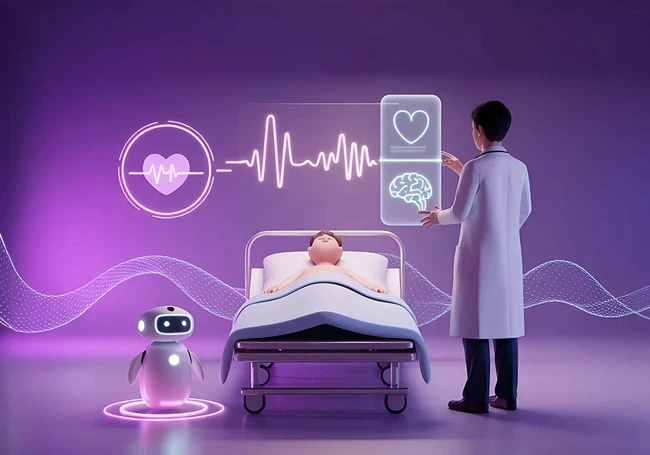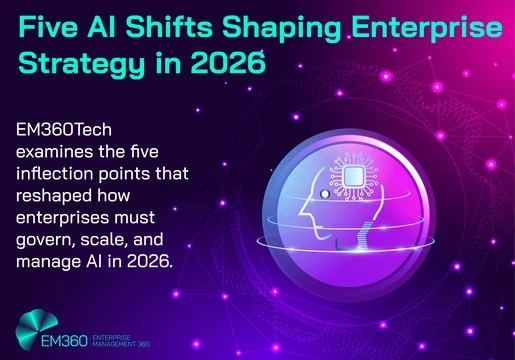Generative AI is having a very specific kind of moment in healthcare and life sciences. Not the hype-heavy “it’ll fix everything” moment. The sharper one, where leaders realise two things at once: there’s real value on the table, and there’s also real risk if they treat this like a normal software rollout.
The hard part is that the same model can be low risk in one workflow and unacceptable in another. Drafting a patient appointment reminder is not the same as summarising an oncology consult note, and neither is the same as generating content that could steer a clinical decision. In life sciences, speeding up regulatory writing is not the same as generating evidence, and it’s definitely not the same as changing how quality decisions are made on the manufacturing floor.
What follows is a practical, enterprise-grade way to think about generative AI across healthcare delivery and the life sciences value chain, with use cases that actually survive contact with privacy, safety, and regulatory reality.

What Generative AI Means in Healthcare and Life Sciences
At its core, generative AI creates new content from patterns learned in data. In healthcare and life sciences, that content is usually text, images, or structured summaries, and it often sits close to sensitive data, high-stakes decisions, or regulated processes.
A useful working definition is this: a large language model (LLM) is a generative AI system designed to produce human-like text, based on the context you provide. Some systems can also accept and generate multiple data types, which the WHO discusses as large multimodal models in its health-focused guidance.
The practical question your readers are trying to answer is simpler than the tech: where does it help, where does it break, and what has to be true before it goes anywhere near production?
Why This Is Different From Traditional AI in Healthcare
Traditional machine learning in healthcare has typically been narrow: classify an image, predict risk, flag anomalies. Generative AI is broader and more fluent, which is exactly why it’s tempting.
It’s also why governance has to be tighter.
The FDA’s GenAI discussion of lifecycle considerations calls out hallucinations as a serious challenge in healthcare contexts where accuracy and truthfulness are critical. That single point changes how you should scope use cases, test outputs, and decide what humans must verify.
The other difference is operational: generative AI doesn’t just change tasks. It changes how knowledge moves through an organisation. That can be a gift in documentation-heavy environments, or a liability if nobody can explain why a model said what it said.
Where Generative AI Fits Best Today
The highest-value deployments are usually the ones that reduce friction without pretending the model is a clinician, a scientist, or a regulator.
In healthcare delivery, GenAI tends to land first in administrative and communication workflows, then expands into clinical documentation support. In life sciences, it often starts with drafting and summarisation across R&D and clinical development functions, then moves toward deeper analytics with stricter controls.
A smart way to segment this is by “distance from patient harm” and “distance from regulatory impact”. The closer you get to either, the more you need evidence, oversight, and constraints.
Use Cases in Healthcare Delivery That Hold Up in the Real World
Clinical documentation and clinician workload
The most immediate opportunity is clinical documentation support: drafting visit summaries, pulling key problems and medications into structured formats, or preparing first-pass notes for clinician review.
This can work because the clinician remains the accountable decision-maker, and the output is treated as a draft, not a source of truth. When it fails, it fails in predictable ways: missing nuance, inventing details, or overconfidently smoothing uncertainty into something that sounds certain.
That failure mode is exactly why healthcare organisations need explicit rules for verification and audit trails, aligned to the FDA’s concern about convincing-but-wrong outputs in safety-critical contexts.
Patient communications and access
GenAI can improve patient experience when it’s used to make information clearer, more consistent, and more accessible. Think appointment instructions, post-discharge guidance written in plain language, or multilingual support that reduces administrative load.
The line you do not cross is using the model as an unsupervised medical advisor. If the system is generating health guidance, you need tight scope, approved content sources, and human review pathways.
Contact centres and operational flow
In call centres and patient admin, GenAI can summarise interactions, draft follow-ups, and suggest next steps based on standard operating procedures. This is where it can reduce time-to-resolution and improve consistency, without placing clinical claims in the model’s mouth.
The win here is operational: fewer handoffs, fewer “can you repeat that?” moments, and more time spent where humans actually add value.
Medical imaging support, with clear boundaries
Generative AI is also used in imaging contexts, including assisting with image enhancement or supporting interpretation workflows. But as soon as software becomes part of a medical purpose workflow, regulation becomes part of the conversation. The FDA’s medical device pages and its broader AI work across the product lifecycle signal that adaptive AI-driven tools often sit outside the old regulatory paradigm.
The right framing for enterprise readers is this: use GenAI to reduce friction and support specialists, but don’t treat it as a replacement for clinical judgement, and don’t deploy it without understanding whether it qualifies as regulated software.
Use Cases in Life Sciences That Actually Move the Needle
Drug discovery and early research acceleration
In early discovery, GenAI can support hypothesis generation, literature synthesis, and candidate ideation. It’s not “the model discovered the drug”. It’s that the model can reduce time spent searching, comparing, and summarising, so researchers can spend more time designing and validating.
Used responsibly, drug discovery support looks like speed and breadth, not automation of scientific truth.
Clinical trial design and feasibility
Trial protocols are dense, multi-constraint documents, and feasibility work often means stitching insights together across past trials, inclusion criteria, sites, and patient populations. GenAI can assist by summarising historical evidence, drafting protocol sections for review, and helping teams pressure-test assumptions earlier.
This is also where you start seeing the need for strong provenance: what sources did the model use, what data is it allowed to touch, and how do you prove that outputs weren’t contaminated by restricted information?
Regulatory and medical writing
This is one of the most practical GenAI deployments in life sciences, because it targets a repeatable, document-heavy workload. Drafting sections, standardising language, summarising study results for internal review, and accelerating variation documents can all be valuable, provided controls are clear.
The EMA reflection paper on AI in the medicinal product lifecycle matters here because it reflects a regulatory expectation that AI use is explained, bounded, and documented, especially where it touches regulated submissions or regulated decision-making.
Pharmacovigilance and safety signal triage
In pharmacovigilance, teams drown in narrative text: case reports, adverse event descriptions, follow-ups, and literature monitoring. GenAI can help classify, summarise, and prioritise, so humans focus on judgement and escalation.
But this is also a classic “hallucination risk” zone. Anything that changes a safety interpretation must be traceable, reviewable, and designed around human accountability.
Manufacturing and quality systems
In manufacturing and quality, the use case is less about creativity and more about controlled summarisation, deviation support, and knowledge retrieval from controlled documentation sets.
This is where “nice-to-have” becomes “prove it”: life sciences organisations live in environments where documentation, audit trails, and validation expectations are not optional. If you can’t show what changed, why it changed, and who approved it, you don’t have a solution. You have a future finding.
The Risk Profile That Leaders Keep Underestimating
The temptation is to reduce risk to “privacy and hallucinations”. Those matter, but the bigger enterprise risk is misalignment: deploying GenAI into a workflow without deciding what the model is allowed to do, what it must never do, and what evidence you require before you trust it.
From the FDA’s perspective, hallucinations that appear authentic can be a significant challenge in healthcare applications where truth matters. From a WHO perspective, governance needs to address accountability and safe use in health contexts where the consequences of failure aren’t theoretical.
For European operations, the EU’s AI Act framing also matters because high-risk systems are expected to meet requirements around risk management, data quality, transparency, and human oversight.
The enterprise takeaway is blunt: the closer GenAI gets to regulated decisions, patient outcomes, or safety reporting, the more it stops being an “AI project” and becomes an operating model change.
Non-Negotiables for Deploying Generative AI Safely
If your readers only take one thing from this piece, it should be that safe GenAI in healthcare and life sciences is built, not bought. You can procure a model. You still have to design the controls.
Here are the non-negotiables that stop GenAI from becoming an expensive incident:
- Define intended use and prohibited use in plain language, tied to workflow boundaries and escalation rules.
- Lock down data governance so teams know what data can be used, where it can be processed, and what must never leave controlled environments.
- Require human review where outputs could influence care, safety interpretation, or regulated decisions.
- Measure performance in context, not in demos, including error types, bias risks, and failure modes that matter to clinicians and regulators.
- Maintain auditability and traceability, especially where outputs feed regulated artefacts or regulated decisions.
For US healthcare organisations, the HIPAA Security Rule’s safeguards for electronic protected health information reinforce that security controls are part of the baseline, not an add-on for AI projects.
How to Choose the Right Use Case Without Getting Burned
A practical selection method is to pressure-test each candidate workflow with three questions:
First, what happens if the model is wrong?
If the answer is “a patient could be harmed”, “a safety signal could be missed”, or “we could submit something inaccurate”, you’re in a high-control zone. You can still do it, but you’ll need stricter guardrails, stronger testing, and clearer accountability.
Second, can we constrain the model to trusted sources?
When GenAI is grounded in approved documents and controlled knowledge bases, it becomes far more predictable. When it freewheels across uncontrolled data, it becomes a confident improviser, which is not what regulated environments need.
Third, can we prove what happened after the fact?
If you can’t audit prompts, outputs, sources used, and human approvals, you’re not ready for scale. You might be ready for a sandbox. That’s not the same thing.
What “Good” Looks Like in Governance and Compliance
There’s no single global rulebook for GenAI, but there are consistent patterns in how credible institutions are approaching it.
The FDA is explicit that traditional medical device paradigms weren’t designed for adaptive AI, and that many changes may require premarket review in device contexts. The EMA is signalling that AI use across the medicines lifecycle needs clarity around scope and scrutiny. The EU AI Act approach emphasises requirements for high-risk medical-purpose systems.
In practice, that means organisations should treat GenAI governance as a blend of:
- model risk management,
- clinical safety thinking,
- data protection and cybersecurity,
- and regulated quality discipline.
It’s not enough to have an AI policy. You need an AI system that can survive audits, incidents, and clinical scrutiny.
The Near-Term Future That Matters More Than Predictions
The most important trend isn’t that GenAI will get smarter. It will.
The more immediate shift is that regulators are already adapting their language and expectations around AI in health and medical products, and enterprises are being pushed toward lifecycle thinking instead of one-off approvals. The FDA’s focus on responsible use across the medical product lifecycle is part of that direction.
You can also see the direction of travel in real-world signals, like the FDA’s qualification of an AI tool to support aspects of liver disease drug development, which reflects momentum toward standardised, regulated AI support in drug development workflows.
For enterprise leaders, the practical implication is clear: build capabilities that scale, not pilots that impress.
FAQs
What is the biggest mistake organisations make with generative AI in healthcare?
Treating it like a generic productivity tool instead of a clinical and regulatory risk decision. The FDA has warned that hallucinations can look authentic, which is dangerous in contexts where accuracy is critical.
Does generative AI count as a medical device?
Sometimes. If software is intended for a medical purpose, it may be regulated as a medical device, and regulators have specific considerations for AI-driven systems. The UK MHRA, for example, notes that many software products (including AI) used in health and social care are regulated as medical devices or IVDs.
How do life sciences teams use generative AI without compromising compliance?
By constraining use cases, grounding outputs in controlled sources, keeping audit trails, and ensuring human accountability for regulated decisions. The EMA reflection paper is a useful signal of the kind of clarity regulators expect around AI use across the medicinal product lifecycle.
What should be prioritised first: use cases or governance?
Governance that is use case-led. You don’t need a 60-page AI manifesto before you start, but you do need boundaries, data controls, and review requirements that match the risk of the workflow.
Final Thoughts: Healthcare GenAI Wins When It Stays Accountable
Generative AI can meaningfully reduce documentation burden, accelerate research workflows, and improve how knowledge moves through healthcare and life sciences organisations. The value is real, but it only compounds when the deployment stays honest about what the model is and isn’t.
The teams that win won’t be the ones who deploy fastest. They’ll be the ones who design the right boundaries, prove reliability in context, and keep humans accountable where it matters most. If you’re building that kind of capability, EM360Tech’s analyst-led conversations and practical deep dives are a strong place to keep your thinking sharp and your decisions defensible.







Comments ( 0 )